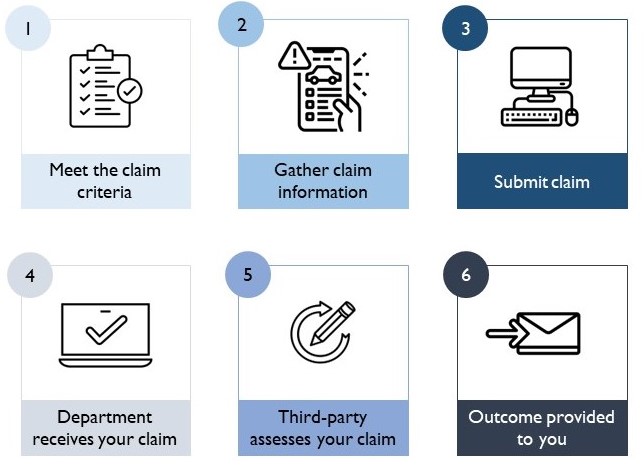Claims for damage
Submitting a claim for compensation for damage and loss.
Submitting a claim for compensation for damage and loss.
If your vehicle has been damaged on a road managed by the Department of State Growth, you may be entitled to compensation.
For claims not related to damage to a vehicle, please see the section below on “Other (non-standard) claims”.
Please read all of the information below before making a claim.
The department maintains the State road network and also manages some infrastructure not on State roads, such as traffic signals and bridges. We have different contracts in place to manage things like road and bridge maintenance, resurfacing and construction projects.
When a contract is awarded to an external contractor, the department formally hands over responsibility for that section of road to the contractor. As the contractor is solely responsible for the care of the work under the contract, the department is not liable for damage or loss through the actions of the contractor.
Our maintenance contracts require our contractors to maintain the State road network to an agreed standard. This does not mean keeping it in perfect condition all the time. But they do have to respond to road hazards that they are made aware of within a reasonable period of time.
Our maintenance contractors also perform routine inspections to identify road hazards and areas that need maintenance or repair. Agreed service standards set out how often inspections occur and when identified issues need to be addressed. These standards vary depending on:
This means that at times there will be defects on the road, such as potholes, water, or storm debris.
Road users are reminded to always drive to the conditions.
You can only make a claim against the department if there is no contractor with responsibility for the State road where the damage occurred.
If there is a contract in place for maintenance or road works, your claim will be referred to the relevant contractor for assessment and response.
For your claim to be successful, you will have to show that we failed to take reasonable steps to prevent foreseeable risks of harm.
You will have to show that our actions (or inactions):
If we have taken all reasonable steps to maintain the road appropriately, we will not be liable.
State Growth will not accept any claims for:
You should also submit any relevant documentation that may support your claim, such as:

Submit a claim for damage by completing the online form.
Claims must be submitted within 30 days of the incident.
If your claim relates to:
Please request a claim form by emailing StateRoadClaims@stategrowth.tas.gov.au or phone 1300 139 933 (select menu item 3).
The 30-day timeframe may be waived for non-standard claims.
State Growth will acknowledge receipt of your claim and may request further information if needed. Once all the information for your claim has been received, we will forward it on for investigation.
State Growth will advise you in writing which party will be assessing your claim and provide contact details. Any questions regarding the progress of your claim must be directed to the party outlined in the letter.
You will be advised of the outcome of your claim by the party responsible for assessing it.
If your claim is denied, this decision is final. Any further queries need to be directed to the party who assessed your claim (outlined in the letter you will receive).
When the department has formally handed over the road to a contractor to manage, we cannot get involved in any disputes between our contractors and other parties. Therefore, there are no avenues for appeal within the department.
If you feel your claim has been unfairly refused, you have the option to appeal the decision through the civil court system. The Magistrates Court is the relevant civil court in Tasmania.
If you feel you have been dealt with unfairly through the administrative process followed by us, or you are dissatisfied with the standard of service we provided, you can lodge a complaint with Ombudsman Tasmania.
The information provided on this page is intended to be general in nature and should not replace independent legal advice.